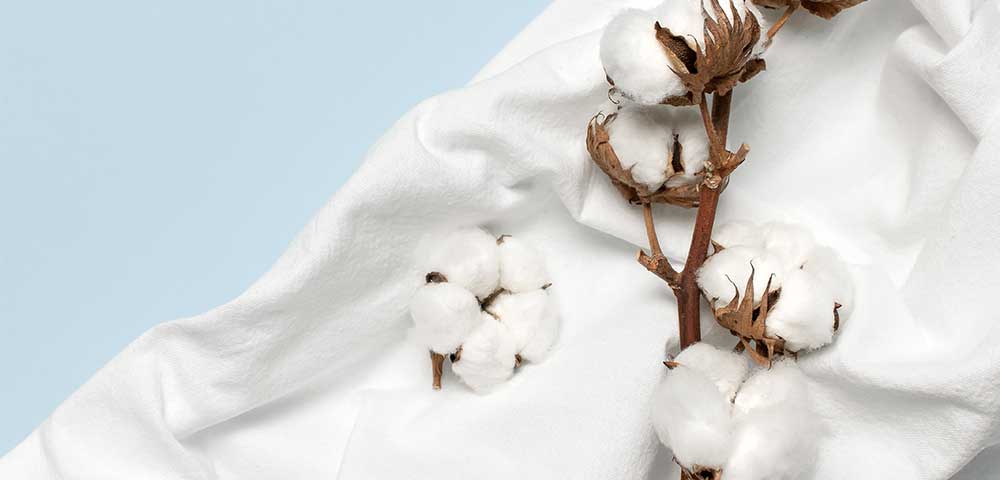Once again, experts from various areas of the international cotton industry as well as the textile supply chain share their thoughts and experience in this special year-end edition that has been enjoying tradition. In short statements, the interviewees analyse current industry issues and assess possible future prospects.
Statement of Stephanie Silber, President of the Bremen Cotton Exchange
- Filomena Pettolino, Xiaoqing Li, Colleen Macmillan, Cotton Fibre Quality Research Scientists, Csiro Agriculture and Food, Australia
- Marzia Lanfranchi, Sustainable Fashion Consultant, Cotton Diaries, Spain
- Jessica Burwin, Sustainability Management, Hch. Kettelhack GmbH & Co. KG, Rheine, Germany
- Jessica Christiansen, Global Cotton, Sorghum & Alfalfa Manager, Bayer Crop Science, St. Louis, USA
- Kim Hanna, President Trans Global Inspection, Rockwell, TX, USA
- Tina Stridde, Managing Director, Aid By Trade Foundation, Hamburg, Germany
- Mary Ankeny, Vice President Product Development & Implementation Operations, Cotton Incorporated, Cary, NC, USA
- Ingeborg Neumann, President of the Confederation of the German Textile and Fashion Industry (t+m), Berlin, Germany
Filomena Pettolino, Xiaoqing Li, Colleen Macmillan, Cotton Fibre Quality Research Scientists, Csiro Agriculture and Food, Australia

Please explain how CSIRO’s research helps to develop cotton with a higher fibre quality and make it more sustainable at the same time.
“We integrate deep science at multiple scales, cocreating with experts throughout the cotton fibre value chain. CSIRO has a successful multidecade Australian cotton breeding program, always innovating with new tech and industry partnerships delivering excellent fibre quality to the market.
Our fibre quality research spans DNA through to novel fibre tech. We research DNA controlling fibre formation, the genes that work together to create unique fibres, and the complex array of cellwall molecules for enhanced fibre quality. This enables synthetic biology and molecular approaches to collaborate with the value chain on biological solutions for fibre sustainability. Examples are CSIRO’s Synbio Future Science Platform Novel Fibres Project, Agriculture&Food gene-networks for differentiated products, and Cotton Breeding Australia’s manipulating fibre composition.
Our high-value fibre research aims to accelerate closing the loop on resource flow and energy use, and valuing people in the process.”
Marzia Lanfranchi, Sustainable Fashion Consultant, Cotton Diaries, Spain

Why is it so important to fight misinformation about cotton?
“Cotton and, more broadly, fashion have a serious misinformation problem. Inaccurate and outdated figures are widely shared, as is data without any context. Many players in this industry and in the consumers’ space amplify misinformation. While there have been attempts to debunk fashion misinformation, we have not taken the problem seriously enough. Fashion misinformation is part of the same societywide information disorder destabilizing democracies and undermining public trust.
We believe that is an obstacle to understanding the environmental, social and economic impact of different fibers and a key reason why we aren’t moving towards positive change. While do not need to agree on a one-size-fits-all solution to environmental and social problems, all players in fashion—from journalists and nonprofits to consumers, suppliers and brands—need to agree on the facts or hope for progress will fade from view.
It is crucial for industries and society to understand the best available data and context on the impact of different fibers and systems within fashion, so that best practices can be developed and implemented, industries can make informed choices, and farmers and other suppliers and makers can be rewarded for and incentivized to operate using more responsible practices that drive more positive impacts.”
Jessica Burwin, Sustainability Management, Hch. Kettelhack GmbH & Co. KG, Rheine, Germany

What challenges does a traditional family business face in terms of sustainable management in the textile chain?
“Due to our production location in Germany, we have been dealing with numerous environmental requirements for many years. In addition, the implementation of corporate due diligence in the supply chain is becoming increasingly important in our sustainability management. It is clear to us that we, as a medium-sized company, will also be indirectly affected by the future supply chain due diligence act. We have already received the first customer inquiries.
As a member of the Partnership for Sustainable Textiles, we have already been able to gain experience with risk analyses as part of the review process. In some areas, however, we still need pragmatic industry solutions that are also suitable for a company of our size. At the same time, it is important to understand the challenge as an opportunity: It is currently more important than ever to work out approaches to solutions together with those involved in the textile value chain, to exchange experiences and to bundle resources.”
Jessica Christiansen, Global Cotton, Sorghum & Alfalfa Manager, Bayer Crop Science, St. Louis, USA

How is cotton research at Bayer Crop Science preparing cotton for the consequences of climate change?
“At Bayer Crop Science we continuously innovate our cotton pipeline to increase yield, fiber quality and overall profitability for growers, with climate change and sustainability being key drivers. As one of the largest agricultural companies in the world, Bayer aims to empower farmers to reduce the on-field GHG emissions of agriculture wherever the company operates. To meet this objective, Bayer fosters and encourages the adoption of climate-smart practices and technologies amongst its farming customer base, such as including cotton farmers in the Bayer Carbon Initiative where they will get paid for certain carbon-smart practices.
Regarding water use efficiency, Bayer continues to focus on providing seeds that perform better in water limited areas, as well as partnering with irrigation technology providers to utilize data analytics and digital tools to improve yield per drop of water. Just a couple of examples of how Bayer plans to ensure cotton production for generations to come!”
Kim Hanna, President Trans Global Inspection, Rockwell, TX, USA

In your opininion, what are the next steps to make the work of women in cotton better appreciated?
“It’s no secret that cotton has historically been a male dominated industry. Women’s participation in leadership positions is critical for our industry’s future, we need to recognize roadblocks that are holding women back so we can improve our diversity and inclusion.
The ICA created the Women in Cotton initiative in 2019, we hold virtual events every 5-6 weeks; Chats for Change, The Global Café, and Women in Action, all freely open to industry.
Chats for Change in 2022 includes topics such as Negotiating, the Perfection Trap and Innovation. Participants will learn and discover tools they can use to help them advance in their careers.
Global Cafe is networking time – industry leaders often participate. These leaders have an opportunity to understand the challenges women face and gain valuable information which they can use to create a more inclusive culture in their own organizations.
Women in Action is a platform to focus a spotlight on women’s achievements that serve as inspiration for our industry.
We all need to appreciate that men and women work differently, but when we work together everyone rises.”
Tina Stridde, Managing Director, Aid By Trade Foundation, Hamburg, Germany

Can Cotton made in Africa benefit from the current trend towards sourcing cotton produced in sustainable systems?
“Cotton made in Africa (CmiA) is more in demand than ever. In 2020, we achieved a new sales record with over 276 million CmiA-labelled textiles, and this successful development will continue in 2021. With over 60 trading companies, 500 registered fabric and yarn producers and 20 African cotton associations, CmiA is now firmly anchored in the global textile value chains.
Both standards – in addition to CmiA, CmiA Organic is also playing an increasingly important role – benefit from the obligation of many companies to use only sustainable raw materials, their demand for comprehensive transparency, if possible right down to the producer, and their commitment to completely CO2-neutral business activities in the medium term, especially supply chains. With a new tracking system and the CmiA Carbon Neutral Initiative, we offer companies innovative solutions for more transparency in the supply chain and the basis for a decarbonised supply chain.”
Mary Ankeny, Vice President Product Development & Implementation Operations, Cotton Incorporated, Cary, NC, USA
 Are there any innovations or new product developments with cotton as main ingredient?
Are there any innovations or new product developments with cotton as main ingredient?
“At Cotton Incorporated we are always looking to improve the sustainability profile of cotton textiles. In some cases, this involves reducing inputs such as water, energy, and chemistry in processing. At other times it means substituting chemistry in a finish to eliminate a product of concern. It also means finding a way to treat cotton to increase its useful life, making the garment more durable and longer lasting.
Cotton Incorporated recently introduced two new sustainable technologies for cotton:
PUREPRESS™ technology is a formaldehyde-free durable press finish for cotton that has several positive characteristics.
A second development, just released in 2021, is TOUGH COTTON™ Technology for Yarn. TOUGH COTTON™ technology was introduced many years ago as an abrasion resistant finish for woven fabrics.
In 2021, a reformulation has enabled TOUGH COTTON™ technology to be exhaust applied to yarn. This process allows a manufacturer to insert TOUGH COTTON™ treated yarns just where they are needed in the garment.
Cotton Incorporated will continue to advance innovative sustainable technologies for cotton as well as partner with companies.”
Ingeborg Neumann, President of the Confederation of the German Textile and Fashion Industry (t+m), Berlin, Germany

The supply chain law is a done deal. What is in store now for the German textile industry and how will it continue at European level?
“Due to the corona pandemic, we are experiencing a lot of chaos in supply chains around the world. That doesn’t exactly make it easier to prepare for the legal requirements of the so-called Due Diligence Act. Nevertheless, we are very active here and offer support through our newly founded t+m CSR consulting agency. We can support companies in anchoring their due diligence obligations in the supply chain and establishing and expanding corresponding structures along the value chain. We are therefore well prepared for the relevant European legislative initiatives.
My advice to politicians in Brussels and Berlin, however, is always to think about feasibility in view of the highly branched global supply chains. We don’t need paper tigers, but general standards that apply to everyone and actually make a difference in the countries of origin.”
We thank all interview partners for their contribution!
The interviews in the column “Question Time“ embody the opinion of the respective interview partner and do not represent the position of the Bremen Cotton Exchange as neutral, independent institution.

